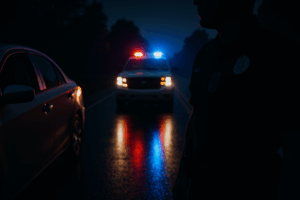How Bodycam Footage Can Help Your DUI Case 
Objective Evidence of Your Behavior
One of the primary advantages of bodycam footage in a DUI case is that it provides a clear, objective record of what happened during the traffic stop and arrest. In many DUI cases, the defendant’s behavior during the stop is a critical factor in determining whether the arresting officer had probable cause to make the arrest. Bodycam footage can provide an unbiased account of your actions, including how you interacted with the officer and whether you appeared intoxicated. If the footage shows that you were cooperative with the officer, that you followed instructions without issue, and that you did not show signs of impairment, it can be a powerful piece of evidence in your favor. For example, if you were polite and calm during the stop, and if you did not show any visible signs of intoxication, this can challenge the officer’s observations, especially if the officer claims that you were aggressive or unsteady on your feet. In addition to capturing your behavior, bodycam footage can also capture the officer’s demeanor. If the officer was rude or unprofessional during the stop, this could be used to question the validity of the arrest. In some cases, the officer’s behavior could be shown to have provoked or escalated the situation, which could undermine the strength of the case against you.Exposing Officer Misconduct or Errors
Bodycam footage also has the potential to expose police misconduct or errors. If the officer failed to read you your Miranda rights, violated protocol, or made mistakes in how they conducted field sobriety tests, this can all be revealed in the footage. Even something as seemingly minor as an officer not properly calibrating the breathalyzer test or improperly administering the field sobriety test can have significant legal implications. In many cases, police misconduct or errors can lead to the dismissal of DUI charges. Bodycam footage that shows the officer failing to follow proper procedure or violating your rights can provide crucial support for your defense. It can also serve as an important tool for your attorney to challenge the officer’s credibility and the evidence gathered during the arrest.Confirming the Officer’s Actions and Procedures
In DUI cases, there can often be a disagreement between the defendant and the officer regarding what actually transpired during the stop. Bodycam footage can verify whether the officer followed proper procedures, whether there was probable cause for the stop, and whether the officer provided a legitimate reason for the arrest. For example, if an officer stops you based on a vague or incorrect reason, the footage can prove that there was no legal justification for the stop in the first place. Furthermore, bodycam footage can help confirm whether the officer properly documented the interaction, including how they administered field sobriety tests, whether they followed protocols for breath or blood tests, and whether they followed the law in handling evidence. If any of these actions were done incorrectly, the bodycam footage can highlight those errors, potentially leading to a favorable outcome for your case.How Bodycam Footage Can Hurt Your DUI Case
Footage Showing Clear Signs of Impairment
While bodycam footage can provide helpful evidence in your favor, it can also be a disadvantage if the footage shows clear signs of impairment. If the officer’s footage captures you showing typical signs of intoxication, such as slurred speech, bloodshot eyes, or unsteady movements, this can work against your defense. DUI cases often rely on subjective observations from the officer, such as their opinion of whether the driver appeared impaired. However, bodycam footage can serve as a visual confirmation of those observations. If the footage shows you failing sobriety tests, such as stumbling during a walk-and-turn test or being unable to follow instructions, this evidence may be hard to dispute. While there may be legal challenges to how the tests were administered, the presence of clear impairment on video can weaken your defense. This is why it’s crucial for your defense attorney to carefully review the footage to identify any potential weaknesses or issues with how the tests were conducted.Inconsistencies in Your Statements or Behavior
During a DUI stop, emotions can run high, and people often make statements or exhibit behavior that they later regret. If you admit to consuming alcohol, drugs, or both before driving, this can be used against you in court. Even a seemingly innocent statement like, “I only had a couple of beers,” could be viewed as an admission of impairment. If your bodycam footage captures you making statements that suggest you were aware of your impairment, it can significantly harm your case.Related Videos
Refusing Field Sobriety Tests
Choosing a DUI Attorney













